|
|
|
Sort Order |
|
|
|
Items / Page
|
|
|
|
|
|
|
| Srl | Item |
| 1 |
ID:
086333
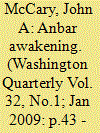

|
|
|
|
|
| Publication |
2009.
|
| Summary/Abstract |
The now-deceased leader of the Anbar Awakening, Sheikh Abd al Sittar Abu Reesha, once said, "Our American friends had not understood us when they came. They were proud, stubborn people and so were we. They worked with the opportunists, now they have turned to the tribes, and this is as it should be."1
Until 2007, the most violent region of insurgent attacks against U.S. forces in Iraq had been al Anbar, the largely rural, expansive western province stretching from the outskirts of Baghdad to Iraq's lengthy, mostly unsecured desert borders with Sunni-dominated Jordan, Saudi Arabia, and Syria.2 In what is most easily described as a marriage of convenience, Sunni insurgents and foreign Sunni al Qaeda fighters in al Anbar had formed a strategic and tactical alliance against what was perceived as an occupation by the United States or, more pointedly, against the occupation of a Muslim land by a largely Christian force, a deep affront to traditional Muslim values harkening back to the Crusades of the Middle Ages.3 Iraqis in al Anbar provided local knowledge, logistics, and up to 95 percent of the personnel, while experienced foreign al Qaeda fighters provided training, expertise, and financing. The pitch was simple: "We are Sunni. You are Sunni. The Americans and Iranians are helping the Shi'a - let's fight them together."
|
|
|
|
|
|
|
|
|
|
|
|
|
|
|
|
| 2 |
ID:
086348
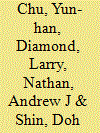

|
|
|
|
|
| Publication |
2009.
|
| Summary/Abstract |
East Asian democracies are in distress. From Bangkok to Manila to Taipei to Seoul to Ulaanbaatar, democratically elected governments in the last few years have suffered inconclusive or disputed electoral outcomes, political strife, partisan gridlock, and recurring political scandals. In 2006-2007, frustrated citizens in Manila and Taipei lost confidence in democratic procedures to the point where they tried to bring down incumbent leaders through extraconstitutional demonstrations, while a crippling political crisis in Thailand in 2006 triggered a military coup.
|
|
|
|
|
|
|
|
|
|
|
|
|
|
|
|
| 3 |
ID:
086347


|
|
|
|
|
| Publication |
2009.
|
| Summary/Abstract |
In reassessing how to secure U. S. interests while stabilizing the Middle East, the new U.S. administration might well decide to postpone or even repudiate democracy promotion. Democratic systems have hardly bloomed in the region since President George W. Bush announced a "forward strategy of freedom" during a speech commemorating the twentieth anniversary of the National Endowment for Democracy in November 2003.1 In fact, U.S. attention seems to have caused more problems than it solved, particularly in Iraq and Palestine. No one can guarantee that the United States can promote democracy in the Middle East without risking stability and critical interests, making it tempting to at least try to set aside the policy until clearer answers emerge, potentially under the guise of a policy review.
|
|
|
|
|
|
|
|
|
|
|
|
|
|
|
|
| 4 |
ID:
086329
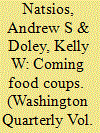

|
|
|
|
|
| Publication |
2009.
|
| Summary/Abstract |
The doubling of grain prices over the past years has already set off violent protests in over 30 developing counteries and led to the overthrow to the Haitian prime minister Jacques Edouard Alexis.Even though the media has provided extensive coverage and analysis of the causes of the increase in food prices, the potential political and security consequences have been given little attention.
|
|
|
|
|
|
|
|
|
|
|
|
|
|
|
|
| 5 |
ID:
086345


|
|
|
|
|
| Publication |
2009.
|
| Summary/Abstract |
George W. Bush's second inaugural address on January 20, 2005 was clearly written with the history books in mind. In ringing terms, the president proclaimed, "The survival of liberty in our land increasingly depends on the success of liberty in other lands. The best hope for peace in our world is the expansion of freedom in all the world."1The pro-democracy rhetoric of the Bush era, however, already looks hubristic, and even somewhat hypocritical, as a new president prepares to take office in the United States. The sweeping universalism of the language employed by Bush was always vulnerable to qualification, when principle encountered local realities. Certainly in some of the United States' closest democratic allies, such as India, Israel, and the United Kingdom, there is an increasingly open skepticism about the idea of placing democracy promotion at the heart of foreign policy.
|
|
|
|
|
|
|
|
|
|
|
|
|
|
|
|
| 6 |
ID:
086349
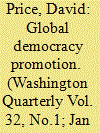

|
|
|
|
|
| Publication |
2009.
|
| Summary/Abstract |
A professed commitment to worldwide democracy promotion has been a hallmark of U.S. foreign policy for many years and was given a distinctive emphasis by the outgoing administration. President George W. Bush calls it "the urgent requirement of our nation's security, and the calling of our time."1 Promoting democracy, however, is not merely a matter of advocacy via an international megaphone. Policies of the Bush administration have led many to question the methods used to promote democracy or even the goal itself. Despite such criticism, much of it warranted, democracy promotion remains a central plank of U.S. foreign policy, an expression of U.S. values, and a tool that can be used to pursue the strategic interests of the United States. It is critically important, therefore, to learn from the mistakes of the past seven years and to rethink and refine the theory and practice of democracy promotion.
|
|
|
|
|
|
|
|
|
|
|
|
|
|
|
|
| 7 |
ID:
086339
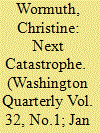

|
|
|
|
|
| Publication |
2009.
|
| Summary/Abstract |
The United States is not ready for the next catastrophe. More than seven years have passed since the country was attacked on September 11, 2001 by violent Islamist extremists who remain free, and who have made clear their willingness to use weapons of mass destruction against the United States, should they be able to acquire or build them. Three years have passed since Hurricane Katrina devastated the Gulf Coast and laid bare myriad flaws in the nation's preparedness and response system. Simply creating the Homeland Security Council (HSC), the Department of Homeland Security (DHS), and U.S. Northern Command has not been enough to prepare the country. The United States still lacks detailed, government-wide plans to respond to a catastrophe. There is still considerable confusion over who will be in charge during a disaster. Very few dedicated military forces are on rapid alert to respond to a crisis here at home. And, there are still no guidelines to determine and assess the capabilities that states, cities, and towns should have to ensure they are prepared for the worst.
|
|
|
|
|
|
|
|
|
|
|
|
|
|
|
|
| 8 |
ID:
086330


|
|
|
|
|
| Publication |
2009.
|
| Summary/Abstract |
The tragic August conflict between Georgia and Russia has initiated a wave of accusations about which side was to blame for the outbreak of full-scale war. The war and its aftermath have ratcheted tensions between the West and Russia, as the international community pressures Moscow to withdraw its troops from Georgian territory and abide by its ceasefire obligations. Russia's reckless decision to recognize the independence of South Ossetia and Abkhazia not only contravenes international law regarding sovereign statehood, but if allowed to stand, would establish the unacceptable precedent that countries can justify military intervention in the territory of a neighbor by invoking the rights of their ethnic citizens. Not surprisingly, Moscow has found little support in the international community for its heavy-handed actions, even among countries friendly to Russia.
|
|
|
|
|
|
|
|
|
|
|
|
|
|
|
|
| 9 |
ID:
086341
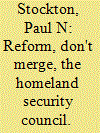

|
|
|
|
|
| Publication |
2009.
|
| Summary/Abstract |
A growing number of scholars argue that the new administration should overturn a key decision made by President George W. Bush: his creation in 2002 of a Homeland Security Council (HSC). Until the September 11, 2001 attacks, the National Security Council (NSC) coordinated the handful of institutions (including the Department of Defense (DOD)) that protected the United States from its adversaries. Bush responded to Al Qaeda's attacks by organizing a sprawling parallel system of institutions to protect the United States from terrorism. The Department of Homeland Security (DHS) is only part of that system. The Bush administration also assigned terrorism prevention functions to the Departments of Agriculture (USDA), Health and Human Services, Interior, and other federal institutions which had never before played such significant roles in securing the United States from attack. Bush capped this parallel security system with the HSC to help guide and coordinate its activities.
|
|
|
|
|
|
|
|
|
|
|
|
|
|
|
|
| 10 |
ID:
086336
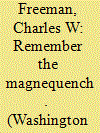

|
|
|
|
|
| Publication |
2009.
|
| Summary/Abstract |
In spring 2008, Senator Hillary Rodham Clinton mounted a quixotic but remarkable comeback in her battle for the Democratic presidential nomination against Senator Barack Obama. Although it ultimately fell just short, part of the success of her resurgent campaign was a tilt in her message from policy to populism. Tapping into the hopes and insecurities of the U.S. public, she repositioned herself as champion of the "forgotten" middle class, focusing her message on pocketbook issues, jobs, and popular anxieties about globalization.
|
|
|
|
|
|
|
|
|
|
|
|
|
|
|
|
| 11 |
ID:
086337


|
|
|
|
|
| Publication |
2009.
|
| Summary/Abstract |
On January 11, 2008, on the eve of the NATO summit meeting in Bucharest, the Ukrainian president, prime minister, and parliamentary speaker wrote to Secretary General Jaap de Hoop Scheffer, asking that Ukraine be invited to begin a Membership Action Plan (MAP) leading to membership in the Alliance.1 In April, the NATO heads of state deferred the issue of MAP for Ukraine, and fellow aspirant Georgia, saying that progress should be assessed at the December 2008 NATO ministerial.2 In that same month, after a tumultuous year of political recriminations and policy deadlock within the ruling coalition, Ukraine is also scheduled, to have its third pre-term parliamentary election in three years.
|
|
|
|
|
|
|
|
|
|
|
|
|
|
|
|
|
|
|
|
|